-
 Bitcoin
Bitcoin $118,698.3676
0.16% -
 Ethereum
Ethereum $3,428.4877
5.97% -
 XRP
XRP $3.2496
9.52% -
 Tether USDt
Tether USDt $1.0002
0.00% -
 BNB
BNB $725.6930
4.36% -
 Solana
Solana $174.8923
4.52% -
 USDC
USDC $0.9997
-0.02% -
 Dogecoin
Dogecoin $0.2139
6.02% -
 TRON
TRON $0.3155
4.62% -
 Cardano
Cardano $0.8045
7.12% -
 Hyperliquid
Hyperliquid $46.6582
-1.72% -
 Stellar
Stellar $0.4676
0.80% -
 Sui
Sui $4.0143
0.38% -
 Chainlink
Chainlink $17.1546
2.97% -
 Hedera
Hedera $0.2458
3.27% -
 Bitcoin Cash
Bitcoin Cash $496.5967
-0.06% -
 Avalanche
Avalanche $22.8813
3.13% -
 Shiba Inu
Shiba Inu $0.0...01439
3.42% -
 UNUS SED LEO
UNUS SED LEO $8.8389
0.42% -
 Toncoin
Toncoin $3.2113
2.82% -
 Litecoin
Litecoin $101.2646
4.24% -
 Polkadot
Polkadot $4.2262
2.32% -
 Monero
Monero $340.4295
2.92% -
 Pepe
Pepe $0.0...01365
2.92% -
 Uniswap
Uniswap $8.9702
-2.78% -
 Bitget Token
Bitget Token $4.7675
2.00% -
 Dai
Dai $0.9998
-0.02% -
 Ethena USDe
Ethena USDe $1.0003
-0.04% -
 Aave
Aave $324.6394
-2.11% -
 Bittensor
Bittensor $433.6051
-0.88%
Who are the authorized participants (APs) for Bitcoin ETFs?
Authorized Participants in Bitcoin ETFs ensure liquidity and price efficiency by creating or redeeming shares, working with custodians to manage Bitcoin holdings.
Jul 11, 2025 at 09:49 am
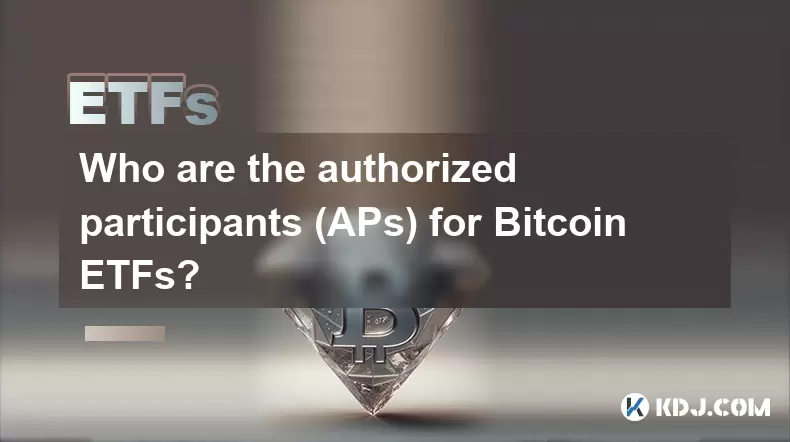
Understanding the Role of Authorized Participants in Bitcoin ETFs
In the world of exchange-traded funds (ETFs), Authorized Participants (APs) play a critical role in maintaining the liquidity and price efficiency of the fund. When it comes to Bitcoin ETFs, APs are typically large financial institutions, such as market makers or broker-dealers, that have been granted special permissions by the ETF issuer. These entities are responsible for creating and redeeming shares of the ETF in bulk, ensuring that the supply of shares aligns with investor demand.
The mechanism through which APs operate is known as the creation and redemption process. This process allows APs to exchange baskets of underlying assets—such as Bitcoin or cash—for newly minted ETF shares, or vice versa. The involvement of APs helps keep the ETF’s market price close to its net asset value (NAV), preventing significant deviations that could lead to arbitrage opportunities.
Eligibility Criteria for Becoming an Authorized Participant
Not just any financial institution can become an AP for a Bitcoin ETF. There are strict eligibility requirements set forth by both the ETF sponsor and regulatory bodies like the U.S. Securities and Exchange Commission (SEC). Typically, APs must be registered broker-dealers or members of major clearinghouses such as the National Securities Clearing Corporation (NSCC) or the Fixed Income Clearing Corporation (FICC).
Additionally, they must meet minimum capital requirements, demonstrate robust risk management systems, and show experience in handling complex financial instruments. Many APs also need to prove their ability to custody or facilitate the transfer of digital assets like Bitcoin, either directly or through partnerships with qualified custodians.
The Relationship Between APs and Bitcoin Custody
One of the unique challenges in the context of Bitcoin ETFs is the custody of the underlying digital asset. Unlike traditional securities, Bitcoin requires secure storage solutions that protect against theft, loss, and unauthorized access. Therefore, APs involved in Bitcoin ETFs often work closely with regulated crypto custodians.
These custodians provide insured, cold-storage solutions for holding the actual Bitcoin backing the ETF shares. In many cases, APs do not hold Bitcoin directly but coordinate with these custodians during the creation and redemption process. This partnership ensures compliance with regulatory standards while maintaining operational efficiency.
Operational Workflow of APs in Bitcoin ETFs
The day-to-day operations of APs in a Bitcoin ETF involve several precise steps:
- Monitoring Market Demand: APs constantly track the trading price of the ETF versus its NAV. If a discrepancy arises, they step in to correct it through arbitrage.
- Initiating Creation or Redemption Orders: When there's excess demand, APs deposit Bitcoin or cash into the ETF in exchange for new shares. Conversely, when there's oversupply, they return ETF shares in exchange for Bitcoin.
- Settlement Through Clearinghouses: All transactions go through established clearing and settlement systems, ensuring transparency and reducing counterparty risk.
- Maintaining Regulatory Compliance: Throughout the process, APs must adhere to reporting obligations and anti-money laundering (AML) protocols mandated by regulators.
Each of these steps requires seamless coordination between the AP, the ETF sponsor, custodians, and clearing institutions to function smoothly.
Differences Between Traditional ETF APs and Those in Bitcoin ETFs
While the core functions remain similar, APs in Bitcoin ETFs face additional complexities compared to those in traditional equity or bond ETFs. For example, the volatility of Bitcoin introduces higher risk exposure, requiring more dynamic hedging strategies. Additionally, the infrastructure around digital asset transfers is still evolving, making the operational workflows more intricate.
Another key difference lies in the settlement process. Traditional ETFs settle trades using standard securities settlement systems like DTC (Depository Trust Company), whereas Bitcoin ETFs may require interfacing with blockchain-based settlement mechanisms or custodial APIs. This necessitates specialized technological capabilities on the part of APs.
Regulatory Oversight and Reporting Requirements
APs in the context of Bitcoin ETFs operate under heightened scrutiny from regulators. They must comply with SEC regulations, including Form 19b-4 filings, which outline the ETF’s operational structure. Moreover, they are subject to regular audits and must maintain detailed records of all creation and redemption activities.
Reporting to regulatory authorities includes disclosing the volume of shares created or redeemed, the value of Bitcoin held, and any unusual trading patterns. These measures are designed to promote transparency and prevent manipulation within the ETF ecosystem.
Frequently Asked Questions
What happens if an AP fails to meet the required capital or compliance standards?
If an AP no longer meets the necessary criteria, they may lose their authorization status. The ETF issuer can revoke their privileges, and they would no longer be allowed to participate in the creation or redemption process.
Can individuals or small firms become APs for Bitcoin ETFs?
Typically, no. AP roles are reserved for large, well-capitalized institutions due to the complexity and scale of operations involved. Individuals or smaller firms lack the infrastructure and regulatory clearance needed to fulfill the responsibilities of an AP.
How does the presence of multiple APs affect the Bitcoin ETF market?
Having multiple APs increases competition, which enhances liquidity and reduces bid-ask spreads. It also improves the ETF’s tracking accuracy relative to its NAV by enabling faster arbitrage responses.
Are APs allowed to trade Bitcoin directly alongside their ETF-related activities?
Yes, APs can engage in direct Bitcoin trading, but they must ensure that their proprietary trading activities do not interfere with their fiduciary duties related to the ETF. Conflicts of interest must be carefully managed and disclosed.
Disclaimer:info@kdj.com
The information provided is not trading advice. kdj.com does not assume any responsibility for any investments made based on the information provided in this article. Cryptocurrencies are highly volatile and it is highly recommended that you invest with caution after thorough research!
If you believe that the content used on this website infringes your copyright, please contact us immediately (info@kdj.com) and we will delete it promptly.
- Shiba Inu, AI Tokens, and the Meme Coin Mania: What's Next?
- 2025-07-18 03:50:12
- XRP's Wild Ride: Chasing ATHs and Cloud Mining Dreams in the Crypto Jungle
- 2025-07-18 02:30:13
- MoonBull, Crypto Gains, and MEW Volume: What's Buzzing in the Meme Coin World?
- 2025-07-18 02:35:12
- Crypto Market, Bull Market, and Policy: Navigating Trump's 'Crypto Week' Rollercoaster
- 2025-07-18 01:50:12
- Winning Design: Nine-Year-Old's Art Becomes a Chocolate Coin!
- 2025-07-18 01:10:12
- Penguin Power, BlockDAG Boldness, and Uniswap's Upswing: Decoding Crypto's Latest Moves
- 2025-07-18 01:50:12
Related knowledge
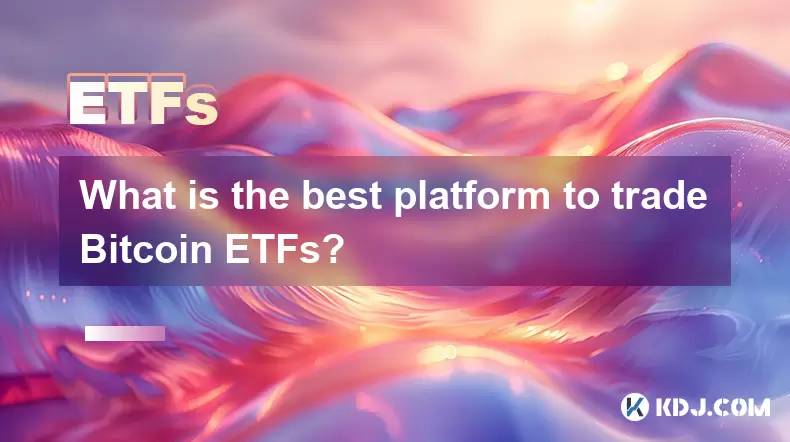
What is the best platform to trade Bitcoin ETFs?
Jul 17,2025 at 03:50pm
Understanding Bitcoin ETFs and Their Role in the MarketBitcoin Exchange-Traded Funds (ETFs) are investment vehicles that track the price of Bitcoin wi...
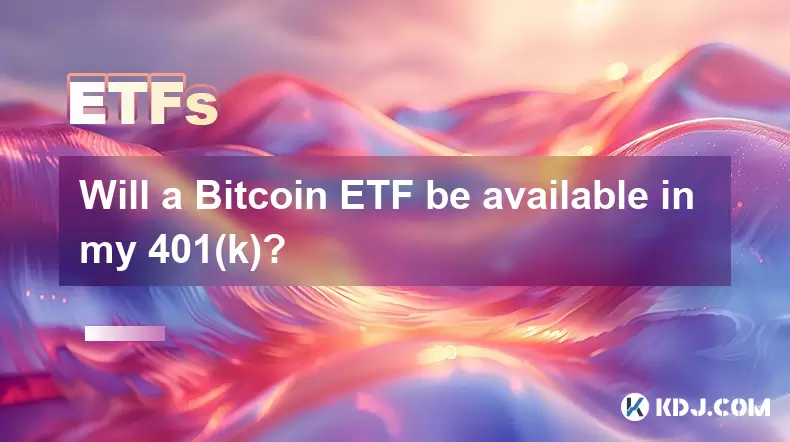
Will a Bitcoin ETF be available in my 401(k)?
Jul 17,2025 at 10:42pm
What is a Bitcoin ETF?A Bitcoin ETF (Exchange-Traded Fund) is an investment vehicle that tracks the price of Bitcoin without requiring investors to di...
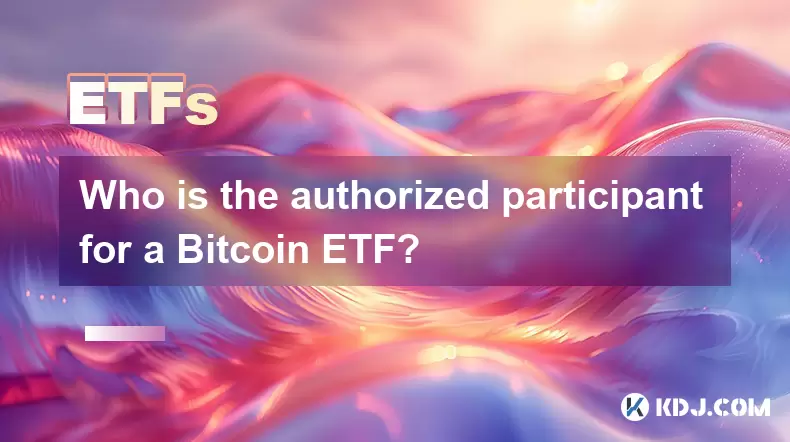
Who is the authorized participant for a Bitcoin ETF?
Jul 18,2025 at 12:42am
Understanding the Role of Authorized Participants in Bitcoin ETFsIn the context of Bitcoin Exchange-Traded Funds (ETFs), an authorized participant (AP...
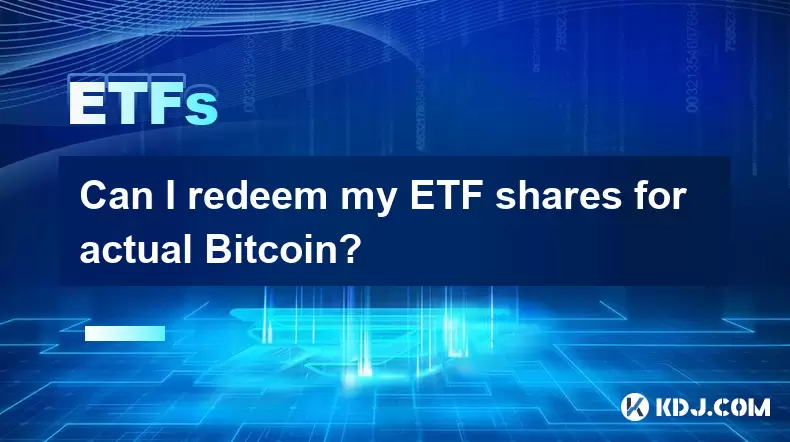
Can I redeem my ETF shares for actual Bitcoin?
Jul 17,2025 at 03:14pm
Understanding ETF Shares and Their Relation to BitcoinExchange-Traded Funds (ETFs) have become a popular investment vehicle for those looking to gain ...
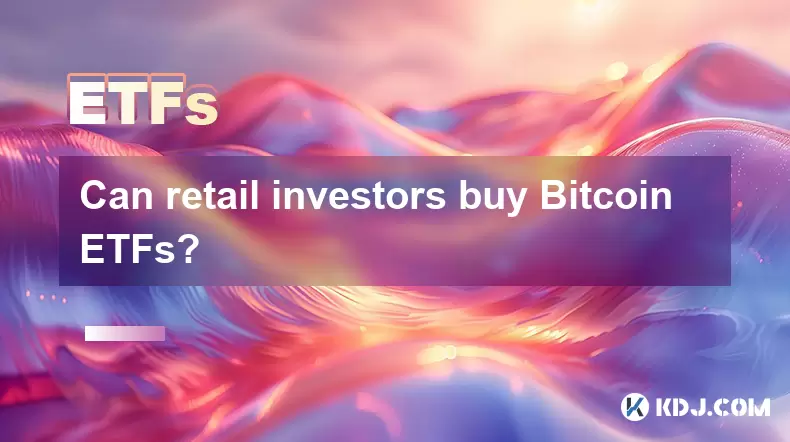
Can retail investors buy Bitcoin ETFs?
Jul 17,2025 at 12:50pm
What is a Bitcoin ETF?A Bitcoin Exchange-Traded Fund (ETF) is an investment vehicle that tracks the price of Bitcoin and trades on traditional stock e...
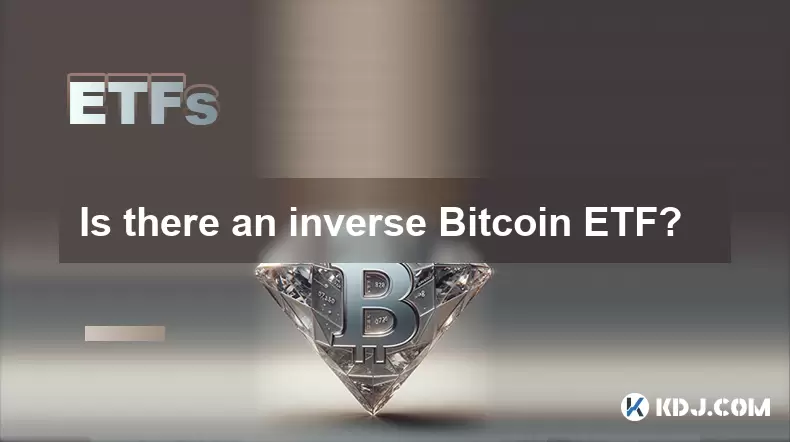
Is there an inverse Bitcoin ETF?
Jul 18,2025 at 01:14am
What is an Inverse Bitcoin ETF?An inverse Bitcoin ETF refers to an exchange-traded fund that aims to deliver the opposite of Bitcoin's daily performan...

What is the best platform to trade Bitcoin ETFs?
Jul 17,2025 at 03:50pm
Understanding Bitcoin ETFs and Their Role in the MarketBitcoin Exchange-Traded Funds (ETFs) are investment vehicles that track the price of Bitcoin wi...

Will a Bitcoin ETF be available in my 401(k)?
Jul 17,2025 at 10:42pm
What is a Bitcoin ETF?A Bitcoin ETF (Exchange-Traded Fund) is an investment vehicle that tracks the price of Bitcoin without requiring investors to di...

Who is the authorized participant for a Bitcoin ETF?
Jul 18,2025 at 12:42am
Understanding the Role of Authorized Participants in Bitcoin ETFsIn the context of Bitcoin Exchange-Traded Funds (ETFs), an authorized participant (AP...

Can I redeem my ETF shares for actual Bitcoin?
Jul 17,2025 at 03:14pm
Understanding ETF Shares and Their Relation to BitcoinExchange-Traded Funds (ETFs) have become a popular investment vehicle for those looking to gain ...

Can retail investors buy Bitcoin ETFs?
Jul 17,2025 at 12:50pm
What is a Bitcoin ETF?A Bitcoin Exchange-Traded Fund (ETF) is an investment vehicle that tracks the price of Bitcoin and trades on traditional stock e...

Is there an inverse Bitcoin ETF?
Jul 18,2025 at 01:14am
What is an Inverse Bitcoin ETF?An inverse Bitcoin ETF refers to an exchange-traded fund that aims to deliver the opposite of Bitcoin's daily performan...
See all articles

























































































